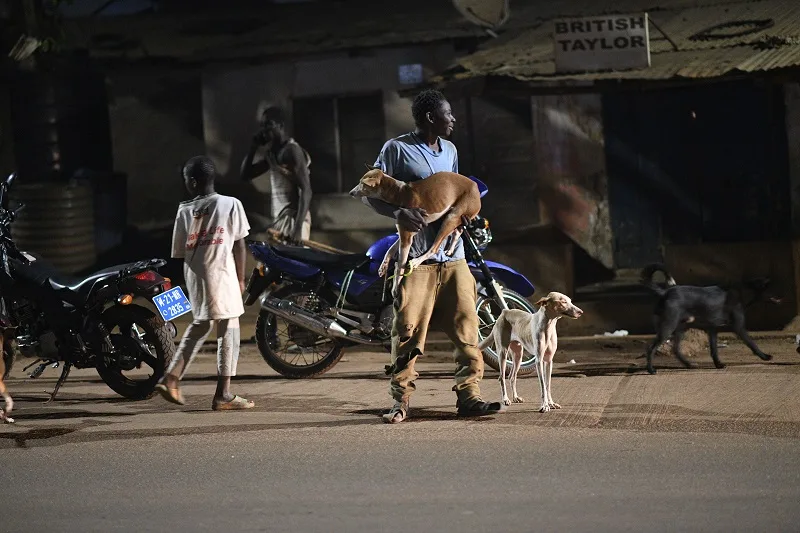News
Pieli: Into the Wild, Why Traditional Hunting Still Thrives in Northern Ghana

At the break of dawn in the bushes of Tibornayiri a remote village just outside Tamale, a group of men, dressed in patched smocks with their trained dogs and armed with handmade guns and machetes, slip quietly into the savanna. Charms tied around their waists sway as they move. This is not a scene from a bygone era, it happens every dry season. The men are on pieli, a centuries old communal hunt deeply rooted in the culture of Northern Ghana.
For generations, pieli is seen beyond a quest for bushmeat, but rather a rite of passage, a survival strategy, and a spiritual exercise rolled into one. Elders speak of it as a dance between man and nature, a tradition carried out with reverence for the spirits of the land and the animals pursued.

Issifu Alhassan, a 58-year-old hunter from Savelugu, said “Pieli” is a Dagbani word from the Dagomba people in Northern Ghana that refers to a traditional communal hunting expedition. It is typically organised during the dry season and involves groups of men from a village or community coming together to hunt wild animals, not just for food, but also for spiritual, medicinal, and cultural purposes.
The practice often follows specific rituals and taboos, such as avoiding certain sacred areas or abstaining from hunting on specific days. Pieli is seen as both a practical means of survival and a symbolic act of unity, bravery, and ancestral connection.

He said, they don’t hunt just to fill their pots, but rather for rituals, to heal the sick, and to honour the ancestors.
According to him, the hunt, which peaks between November and March, is carefully timed, the dry season strips the bush bare, making tracking easier.
“Hunters often consult lunar calendars and village elders before setting out, where in many communities, certain days are off-limits, and some groves remain sacred no hunting allowed,” he added.
Mohammed Zakaria, another seasoned hunter in an interview said, not all animals are meant to be killed, explaining that pregnant ones, are left unhunt and as well they don’t hunt near shrines, which is our way of keeping balance.

He revealed that, in the Tamale markets, bush meat once shared within families has become a commodity, which has led to rise in demand, especially during festivals, wild rabbit, bush rat, and antelope fetch high prices.
Alhassan revealed an interesting happening saying, they don’t see animals like how they used to due to degradation.
We now travel farther, using more aggressive methods, which have left us to break old rules of hunting, he said.
To curb overhunting, Ghana’s Wildlife Division enforces a “Closed Season” from August to December, banning hunting nationwide, but in the rural north, enforcement is a challenge.
Many hunters feel misunderstood. “They ban us without offering alternatives,” Zakaria says. “This is our way of life. How do we stop?”
Some communities are taking matters into their own hands, mixing modern conservation with traditional wisdom. Others call for education instead of punishment.
Mr Abdul Rahman, a conservationist working with a local NGO said, hunters should be seen as partners, in order to achieve the goal of the wildlife authorities, saying the hunters know the bush better than anyone.
With the right support, they can help protect it, he added.
As the sun start settling lower revealing it beautiful silhouette, the hunters return from the bush in trucks full of hunters with their dogs, tired, quiet, and reverent.
Their catch is modest, a grasscutter, a hare, and a few guinea fowl. Not a bounty, but enough for supper.
For now, pieli endures, not just as a hunt, but as a bond between generations
By Geoffrey Buta
News
2 convicted for human trafficking

The Achimota Circuit Court has convicted two persons for trafficking two ladies from Nigeria to Ghana and compelling them to engage in prostitution.
Jessica Daniel, also known as Blessing, a 24-year-old hairdresser, and Kelvin Johnson, known as Alaska, a 30-year-old Bitcoin trader, were convicted after they were found guilty at the end of the trial.
The two were held on charges of conspiracy to commit crime and two counts of human trafficking.
The Court, presided over by Mrs Akosua Anokyewaa Adjepong, however, deferred their sentence, pending the outcome of a pregnancy test for Jessica, the first accused person.
Reading her Judgment on Tuesday, the trial Judge said the Prosecution had been able to establish its case beyond reasonable doubt after calling three witnesses while the accused persons also called a witness.
The Prosecution, led by Assistant Superintendent of Police (ASP) Isaac Babayi, earlier told the court that the complainant was Chief Calistus Elozipuwa, a member of the Nigerians in Diaspora Organisation (NIDO), based in Ghana.
ASP Babayi said on July 1, 2024, the complainant rescued the victims, Gloria Vincent, alias Grace, 20 years, and Gloria Igbetar, alias Diamond, aged 25, who were engaging in prostitution.
When they were questioned, they told the complainant that they were deceived, lured and transported to Ghana from Nigeria by Jessica in January and February 2024, under the pretext of securing them jobs as domestic servants but ended up forcing them into prostitution.
According to the prosecution, the victims were linked to an agent in Nigeria by Johnson, who picked them at the lorry station in Accra and took them to an apartment where they stayed and worked as prostitutes for Jessica, who demanded they paid GH₵8,000.00 each to gain their freedom.
Prosecution told the court that Jessica and Johnson were subsequently arrested by the police.
During investigation, they admitted having recruited the victims from Nigeria to Ghana for prostitution, the proceeds of which were collected by Johnson and handed to Jessica for safekeeping.
Investigations further revealed that Jessica hid behind Johnson to traffic the ladies to Ghana with the excuse that she was afraid they might harm her, if they found out that she was their mistress.
The victims have been able to pay GH₵8,000.00 each to the convicts, which they (convicts) both admitted having received.
—GNA
News
Ban use of tyres, firewood to singe meat — Toxicologist

A leading environmental toxicologist has made an urgent call on government to prohibit the use of tyres and firewood in meat singeing, citing compelling scientific evidence of severe public health risks.
Dr Prosper Manu Abdulai, a researcher and lecturer at the Mampong Campus of the Akenten Appiah Menka University of Skills and Entrepreneurial Development (AAMUSTED), presented the findings from a comprehensive national study, revealing widespread contamination in meat products processed using these methods.
In a chat with The Spectator, Dr Abdulai explained that burning tyres releases harmful chemicals, especially Benzo[a]pyrene—a substance officially recognised by international health organisations as causing cancer, particularly blood-related cancers like leukemia.
“When rubber tyres burn, they release a dangerous cocktail of toxic chemicals,” Dr Abdulai explained.
“Besides Benzo[a]pyrene, we’ve found high levels of industrial chemicals like PCBs, dioxins, and furans—substances that don’t break down easily in the environment, accumulate in the body’s fat tissues, and interfere with hormone function.”
The research, conducted in 2023, at the various abattoirs in the country, also discovered worrying levels of six heavy metals in the processed meat- including lead, cadmium, arsenic, nickel, copper and iron—all exceeding safety limits set by international food safety authorities.
Regarding traditional firewood burning, Dr Abdulai broke down the specific dangers: “When wood doesn’t burn completely, it creates tiny particles small enough to enter the lungs and bloodstream, along with cancer-causing compounds that can damage DNA and alter how genes function.”
Data from the Ghana Statistical Service attributes approximately 4,000 annual cancer-related deaths to contaminated meat consumption.
“Our tests show that even after washing the meat thoroughly, the cancer-causing substances remain at levels higher than what World Health Organisation (WHO) consider safe,” he emphasised.
The toxicologist advocated immediate regulatory action and proposed alternative processing technologies, particularly systems that could convert abattoir waste into biogas – providing a clean energy source while eliminating harmful emissions.
“The scientific evidence is clear,” Dr Abdulai stated. “We’re seeing more cases of reproductive problems, including reduced fertility in both men and women, which can be linked to long-term exposure to these foreign chemicals in the body.”
He concluded with a straightforward appeal: “Our research shows a direct relationship – the more exposure to these chemicals, the greater the health risks. Protecting public health requires us to immediately implement safer meat processing methods based on sound science.”
From Kingsley E. Hope, Kumasi















